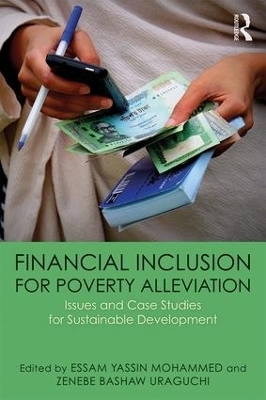
Financial Inclusion for Poverty Alleviation
Routledge (Verlag)
978-1-138-10276-7 (ISBN)
More than one billion people still live below the poverty line – most of them in South Asia and Sub-Saharan Africa. Financial inclusion is a major issue, as more than three-quarters of the numbers of poor and disadvantaged women and men do not have access to financial products and services, such as bank accounts, affordable and suitable loans, and insurance.
The key objective of this book is to provide practical case studies of financial inclusion, rather than focus on academic debates such as the ideological basis of promoting microfinance. Using the recently adopted Sustainable Development Goals as an overall framing of the issues, it shows how poor and disadvantaged women and men can be bankable if the right facilitation for maximizing opportunities and addressing constraints are in place. Case studies confirm that achieving inclusive and sustainable access to financial products and services goes beyond simply enabling poor and disadvantaged women and men to have access to credit, or the ability to open a bank account. Examples from Africa, Asia and Latin America demonstrate encouraging progress in making microcredit accessible to millions of poor people. The foremost challenge, however, has been to ensure that they have access to, and usage intensity of, suitable and affordable financial products and services that meet the needs of their livelihoods as well as risks and mitigation strategies. This requires understanding that poor and disadvantaged women and men do not exist in isolation from complex and interdependent functions in the financial system, which includes a number of actors, diversified services, constraints (not just symptoms) and capacities and incentives.
Overall, the book provides a rich source of examples of how building inclusive financial systems can empower the world's poor – by increasing income and employment opportunities, securing livelihoods and reducing poverty.
Essam Yassin Mohammed is Senior Economist, Sustainable Markets Group, at the International Institute for Environment and Development (IIED), London, UK. Zenebe Bashaw Uraguchi is Senior Advisor, Market Systems Development, and Programme Coordinator, Eastern Europe Unit, for Helvetas Swiss Intercooperation, Switzerland.
1. Introduction 2. From Access to Progress: Setting Our Sights on a Worthier Goal 3. The Bangladesh Experience on Financial Inclusion: A Market Systems Review 4. Financial Inclusion: Understanding Concept, Barriers and Measurement 5. Towards inclusion through lessons from informal money lenders 6. Extending access to the formal financial system: the Banking Correspondent business model 7. Savings as Forward Payments: Innovations on Mobile Money Platforms 8. Mobile Money and Financial Inclusion: The Case of Susu Operations in Ghana 9. Towards a gender transformative approach to financial inclusion: Lessons from CARE’s Village Savings and Loan Associations in sub-Saharan Africa 10. Gender-based barriers and opportunities to financial inclusion: New evidence from Ghana 11. Islamic Finance Approach to Financial Inclusion to Enhance Shared-Prosperity 12. Vulnerability Reduction Efficacy of Financial Inclusion to Climate and Economic Changes: Evidences, Bottlenecks and Way Forward 13. Green Microedit-Assisted Microenterprises in a Wetland Area of Bangladesh and its Implications for Women Empowerment and Ecological Sustainability 14. Where to from here?
| Erscheinungsdatum | 22.12.2017 |
|---|---|
| Zusatzinfo | 36 Tables, black and white; 19 Line drawings, black and white; 13 Halftones, black and white; 66 Illustrations, black and white |
| Verlagsort | London |
| Sprache | englisch |
| Maße | 156 x 234 mm |
| Gewicht | 453 g |
| Themenwelt | Naturwissenschaften ► Geowissenschaften ► Geografie / Kartografie |
| Sozialwissenschaften ► Soziologie ► Spezielle Soziologien | |
| Wirtschaft ► Volkswirtschaftslehre ► Finanzwissenschaft | |
| ISBN-10 | 1-138-10276-8 / 1138102768 |
| ISBN-13 | 978-1-138-10276-7 / 9781138102767 |
| Zustand | Neuware |
| Haben Sie eine Frage zum Produkt? |
aus dem Bereich


